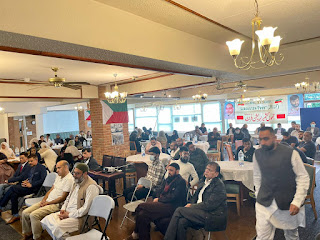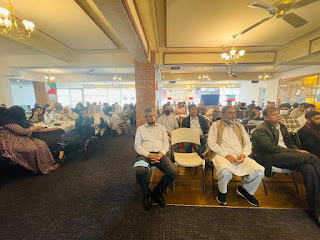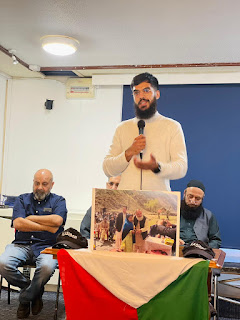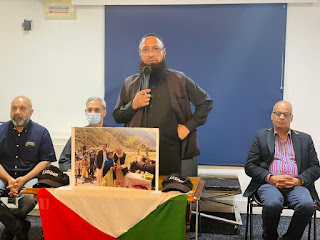An open letter addressed to the G7 leaders on their 47th
summit held at the Cornish resort of Carbis Bay UK from 11 to 13 June 2021.
Date:
11 June 2021
Re: The G7 leaders and their nations’ obligation to
the oppressed people of Kashmir.
Dear Excellencies,
We
take this opportunity to remind you as leaders of G7 nations during 47th summit
of your powerful group being held at Carbis Bay in Cornwall, United Kingdom, on
the most pressing and untenably distressing political, and human rights
situation that exists in the Indian occupied part of Jammu and Kashmir-
generally referred to as Kashmir- in particular since 5 August 2019.
Excellencies
there are around two dozen UN resolutions on the Kashmir issue that require India and Pakistan to hold a UN supervised
plebiscite on the political status of the territory in accordance with
Kashmiris’ basic right to self-determination. Your Excellencies’ governments
are fully aware of the history of the issue/dispute as it is the oldest dispute
which was brought before the UN by India on 31 December 1947. Your Excellencies are equally aware that
since January 1948 India and Pakistan have lamentably failed as UN Proxies in
Kashmir, to resolve the issue bilaterally as both nuclear powered adversaries,
are in de-facto control of Kashmir across the ceasefire line- CfL.
Quite
erroneously Kashmir issue is seen by some as a territorial dispute between
India and Pakistan. For 22 million Kashmiris across both sides of the CfL
however, it is an issue inherently linked with their unfeterred sovereign right
to be the final ‘arbiters’ of Kashmir’s political destiny as Pandit Jawaharlal
Nehru once declared.
Despite
India’s obligations on Kashmir India’s Modi led BJP/RSS government abolished
articles 370 and 35A of its Constitution, and annexed and created two union
territories of Ladakh, and that of Jammu and Kashmir on 5 August 2019, to be
ruled directly from Delhi in blatant contravention of UN resolutions 38 of 17
January 1948, 91 of 30 March 1951 and 122
of 24 January 1957, as well as mutual agreements with Kashmir including the provisional, and
conditional ‘accession’ of 26 October 1947, and the bilateral accords with
India’s adversary and the other claimant
on Kashmir- Pakistan.
Excellencies, the
aggression committed against Kashmir by the Modi government was carried out
under a veil of secrecy, with unprecedented number of military reinforcements,
the curfews, an atmosphere of dis-information, dissolution of the assembly,
total black-out of the media, and arrests
of political opponents in particular that of the Chairman of the pro independent Jammu Kashmir Liberation Front- JKLF- Mr Yasin Malik under the Public Safety Act PSA,
and banning the JKLF under the Unlawful Activities Prevention Act, UAPA.
These
repressive laws used by the Indian state against political dissent in Kashmir
for decades, came under scrutiny of the UNOHCHR in its reports on Kashmir in
June 2018 and July 2019 which called the PSA, UAPA and AFSPA repressive and
recommended repeal of all or part of these laws as the UN body considered them
inconsistent with international law; and therefore as a consequence of these
laws, in its reports, OHCHR “highlights
serious human rights violations and patterns of impunity in Indian-Administered
Kashmir.”
Excellencies,
since 5 August 2019 Kashmir remains under siege, enforced by a staggering number
of 900,000 Indian military and para military troops! Clearly with these actions,
Modi government considers itself above international law, while the UNSC and the P5 in particular, continue to look the other way on the denial
by India of basic, civil, political and human rights of the Kashmiris who
remain forcibly divided, and captive in their own homeland between India and Pakistan
since 1947.
Excellencies, the
United Kingdom, host of the 2021 G7 summit has extended special invitation to
the leading democracies that includes India, Australia and South Korea as guest
participants to the summit. India’s democratic credibility under Mr Modi and
his RSS supported BJP government however, should seriously be called into
question because of his policies on the basic rights of religious minorities,
mainly the Muslims, Christians, Sikhs, and the Dalits in India itself, and his government’s
reprehensible policies and illegal actions in Kashmir against the fundamental
political, civil and human rights of the entire population.
While it is perfectly in order for the G7 nations
to focus on the Covid-19 pandemic,
and to address the issues related with equitable allocations of vaccine to
poorer countries, and challenges resulting from climate change; it is
nevertheless important that this apex group of leading economic and political
powers in the world including three members of the P5 with India in attendance as
a non-permanent UNSC member since January 2021, to discuss the plight of the
oppressed people of Kashmir.
It
is not a coincidence therefore, that the UNGA President Mr Volkan Bozkir during
his visit to Pakistan at the end of May 2021 called on “all parties to refrain from changing the status of Jammu and
Kashmir and said a solution was to be found through peaceful means in
accordance with the UN charter and UN Security Council resolutions.”
Excellencies,
in 1994 prompted and encouraged, with promises to resolve the Kashmir issue by
the US, the UK, the EU, and prominent members of the civil and political
fraternity in India itself, Mr Yasin
Malik, declared unilateral ceasefire to transition the freedom movement to a
peaceful, political and diplomatic mode of struggle to seek a just and
permanent solution of the Kashmir issue.
Despite
unilaterally giving up militancy in 1994, the Indian military killed over 600
members of Mr Yasin Malik party while, miraculously he survived six attempts on
his life. Nevertheless he remained committed to his peaceful journey of finding
a solution on the undecided status of his motherland. He undertook various political initiatives like the 2003
signature campaign, and the 2007 journey for freedom throughout Kashmir to
promote non-violence, and engage in peaceful and political democratic
resistance. The international community and the previous Indian government acknowledged
efforts of the JKLF, and invited Mr Yasin Malik for talks with the then Indian
Prime Minister, Dr Manmohan Singh in 2006.
In 2014, the BJP led by Mr Modi gained power in
India. The ultra-right-wing chauvinist rule of the BJP from the outset began to
nullify previous mutual undertakings that were painstakingly evolved for a
conducive atmosphere toward an ultimately equitable resolution of the Kashmir
issue.
Excellencies, this policy change was not surprising since the
Modi led BJP supported by the RSS came in with a Hindu supremacist agenda based
on the Hindutva ideology, which rejects Mahatma Gandhi as the founding father of
modern India, and glorifies his assassin and RSS activist Natho Ram Ghodse, as
an Indian hero. Since Hindutva ideology sees India as a Hindu rather than a
secular nation, the BJP secured electoral victories both in the election of
2014 and in 2019 on a communal majoritarian agenda.
On Kashmir, and in direct contravention of the
UN Charter, and its resolutions, Mr Modi’s government began to fulfil its
agenda in earnest with annexing Kashmir, taking away its special status, and
depriving the people of their fundamental rights as citizens of Jammu Kashmir.
Primarily Mr Modi’s government has embarked on a policy of demographic change
to turn the majority Muslim population of Kashmir through settler colonialism,
into an inconsequential minority. This is being achieved with new domicile
rules resulting from the illegal abrogation of article 35A of the Indian
constitution that guaranteed continuation of the pre 1947 definition of
citizenship rights in Kashmir. With these illegal rules, Modi government has
literally opened up Kashmir to the entire 1.3 billion people of India.
By
December 2020 sixteen months after the annexation and direct rule of Kashmir by
New Delhi, promulgation of the new rules and settler colonial policy, resulted
in more than 1.2 million domicile certificates having been issued with one or
the other pretext, to non-Kashmiris. At this rate, when Mr Modi’s ultra-
nationalist BJP goes to the polls in the 2024 Indian general election, a declaration
of victory over Kashmir, will inevitably be made by Mr Modi- a proud political
progeny of the RSS himself- to heighten majoritarian extremist sentiments in
his bid to be re-elected, for the likely third term.
To throttle the opposition in Kashmir prior to
Mr Modi’s anti-Kashmir onslaught, with a brazenly pernicious attack on the
history of Kashmir, social, cultural and political identity of its people, his government arrested Mr Yasin Malik
on 22 February 2019, and a month later on 23 March banned his party under
politically motivated and fabricated charges. Mr Yasin Malik was taken to India
from Kashmir, and put in solitary confinement at India’s infamous Tihar Jail
where the ailing Kashmiri leader is being held for the last almost 28 months
without appropriate medical care and other facilities.
Excellencies, bail which is a fundamental right of every
detainee according to Indian constitution, has been denied to Mr Yasin Malik,
and other political leaders in custody. Covid-19
prompted the Indian Supreme Court to issue orders for the release of those in
custody on bail or parole, to save their lives. The BJP government however, has
not released either Mr Yasin Malik or any of the other hundreds of prisoners.
Kashmiri political leaders detained under draconian laws are treated badly by
the Indian authorities.
For example 75 year old Mohammad Ashraf Khan Sehraie,
a respected prominent political leader held under the PSA died- nay- killed,
due to deliberate denial of medical attention. Appropriate burial rites were also
denied, and on calls for a probe by his family about his death in custody, his
two sons were arrested by the Indian authorities. Unfortunately even the
judiciary is coerced and used against Kashmiris, in Mr Modi’s ‘democratic India.’
Since 5 August 2019 there is a total ban on
political activities in Indian occupied Kashmir and stringent controls on all
forms of press and media. Journalists are coerced and arrested under notorious PSA.
International media is denied entry into Kashmir. Political dissent, right to
free speech, and freedom of assembly, taken for granted in a democracy, are denied
with threats of prolong incarceration
under the notorious ‘security’ laws which lengthen detention of thousands of innocent Kashmiris indefinitely.
The only free media in ‘democratic’ India of today, is that which acts as the
mouthpiece for Mr Modi’s ultra-chauvinist BJP government.
Excellencies, silence by the G7 nations over the Kashmir
issue, and their indifference to the immense suffering in Kashmir due to the
ongoing siege of Kashmir by India, is seen by Kashmiris as complicity in their plight
and support for Modi government’s oppressive and illegal policies against their
UN recognised right to self-determination. The powerful G7 nations therefore,
have an obligation to ensure that Mr Modi’s ‘democratic’ India stops ‘legal
repression’ and militarised violence against the population, and honours its commitments
based within the legitimate and recognised historic context of the longstanding
Kashmir issue.
The release of political prisoners, not only on
health grounds, is important in this context as it would be a step in the right
direction on the road to an equitable settlement of the issue. Incarcerated Kashmiri
leaders are part of the solution in Kashmir, and their continued illegal
detention will not serve the cause of peace with justice, and democracy, either
in Kashmir or in the wider South Asian region.
We urge G7 leaders to impress upon Mr Modi that the
following incarcerated leaders Mr Yasin Malik the Chairman of the JKLF, Syed
Shabir Ahmed Shah, Mr Altaf Ahmed, Syed Aftab Hilali, Syeda Aasiya Andrabi, and
her female colleagues, Mr Masarat Alam, Mr Ayaz Akbar and others are
immediately and unconditionally released as they are all part and parcel of a
lasting, and peaceful solution of the Kashmir issue, and see Jammu Kashmir as a
bridge of peace in South Asia, and a cross roads of regional development and
prosperity.
Sincerely,
Zafar
Khan
Chairman- Diplomatic Bureau of Jammu Kashmir
Liberation Front-JKLF
Email:
zafargk@aol.com
Central
Information Office-CIO:
B-144
Satellite Town Murree Road Rawalpindi Pakistan.
Email:
jklf1977@gmail.com
































